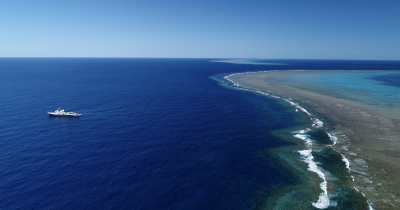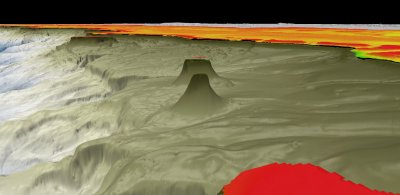A huge, detached coral reef measuring over 1,600 feet in height has been discovered on Australia's Great Barrier Reef—the first to be found in over 120 years.
The reef was found on October 20 during an underwater mapping expedition of the northern section of the Great Barrier Reef seafloor. After the initial dive, researchers with the Schmidt Ocean Institute carried out another expedition to the site to confirm the discovery.
"This unexpected discovery affirms that we continue to find unknown structures and new species in our ocean," Wendy Schmidt, co-founder of Schmidt Ocean Institute, said in a statement. "The state of our knowledge about what's in the ocean has long been so limited. Thanks to new technologies that work as our eyes, ears and hands in the deep ocean, we have the capacity to explore like never before. New oceanscapes are opening to us, revealing the ecosystems and diverse life forms that share the planet with us."
The base of the reef is almost 5,000 feet wide and 1,600 feet high—taller than the Empire State Building. Its peak is just 130 feet below the surface of the ocean. Footage of the discovery was live-streamed and can be viewed below.
It is one of seven other detached reefs in the region that have been mapped since the end of the 19th century.
At almost 133,000 square miles, the Great Barrier Reef is the largest living structure in the world. It includes around 3,000 coral reefs, 600 continental islands and 150 inshore mangrove islands. It extends from the northern tip of Queensland down to the city of Bundaberg—roughly 1,500 miles.
The Great Barrier Reef is currently under threat, with climate change causing widespread damage to the ecosystem through an increase in extreme weather events and coral bleaching. This is where warm temperatures place the coral under stress, causing the coral to expel algae, which turns them white. While this does not necessarily kill the algae, it leaves them vulnerable. Prolonged or repeated bleaching events can kill coral reefs.


A report by the ARC Centre of Excellence for Coral Reef Studies released earlier in October showed the Great Barrier Reef has lost half of its corals since the mid 1990s. Andy Dietzel, who led the research published in the Proceedings of the Royal Society B, said the findings show the Great Barrier Reef's ability to recover from extreme events is compromised and that a better understanding of the system is urgently required.
Researchers with the Schmidt Ocean Institute are currently carrying out a year-long exploration project looking at the waters off the coast of Australia. The Northern depths voyage, during which the latest reef was found, will run until November 17.
Maps created as part of the project will be made available on a national seabed mapping program.
"To find a new half-a-kilometer tall reef in the offshore Cape York area of the well-recognized Great Barrier Reef shows how mysterious the world is just beyond our coastline," Jyotika Virmani, executive director of Schmidt Ocean Institute, said in a statement. "This powerful combination of mapping data and underwater imagery will be used to understand this new reef and its role within the incredible Great Barrier Reef World Heritage Area."
Uncommon Knowledge
Newsweek is committed to challenging conventional wisdom and finding connections in the search for common ground.
Newsweek is committed to challenging conventional wisdom and finding connections in the search for common ground.
About the writer
Hannah Osborne is Nesweek's Science Editor, based in London, UK. Hannah joined Newsweek in 2017 from IBTimes UK. She is ... Read more





